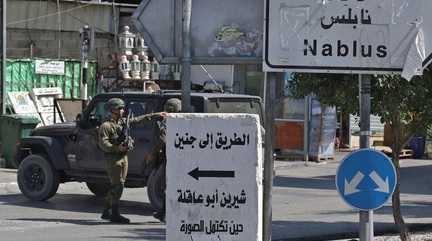
05 Nov 2022; MEMO: Twenty-one days of Israel's siege has damaged the economy of the occupied West Bank city of Nablus and resulted in major commercial losses for traders, Anadolu Agency reported on Friday.
Palestinian traders and officials from Nablus, the major commercial hub in the West Bank, said that the Israeli siege has suffocated the city and its residents and resulted in economic losses that require much time to recover.
On 12 October, the Israeli occupation surrounded the city with high cement blocks, large sandbags and sand barricades, imposing a strict siege on the city, which, according to the Palestinian Ministry of Economy, includes 17,113 commercial and industrial facilities.
The siege lasted for 21 days, as the Israeli occupation announced lifting the restrictions on the city on 3 November.
Speaking to Anadolu Agency, trader Ahmad Abu Hashish shared: "Nablus lived a choking siege that crippled its economy. The siege affected a large number of traders and shop owners."
Abu Hashish owns a clothes shop on a road closed with sand barricades: "This street serves the governates of Nablus, Tulkarm, Jenin and Qalqilia. People travelling to and from Ramallah pass through this way. It has a strategic commercial location."
He continued: "During the siege, it was almost empty. We lived hard days. In addition to the siege, the Israeli occupation imposed curfews from time to time."
Meanwhile, Mujahed Salam, another shop owner, said that the city witnessed a crippling siege similar to the one imposed at the beginning of the second Intifada.
He indicated that Palestinians from Nablus, major West Bank cities and Palestinian cities from Israel shop at Nablus shops, which include a wide variety of goods.
Spokesperson of the Nablus Chamber of Commerce Yassin Dweekat said that the city's economy had suffered losses estimated at hundreds of millions of US dollars.
Dweekat explained that Nablus includes four industrial zones and that the Israeli siege paralysed a large portion of the West Bank economy.
The Palestinian Ministry of Economy confirmed that the siege stopped the operations of 50 per cent of the city's factories, noting that this led to an economic retreat of 60 per cent.




